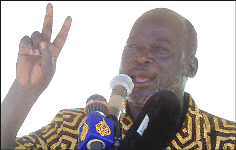Peace in Sudan’s Darfur needs neutral force and new govt: Garang
By Charles Cobb Jr
WASHINGTON, Sep 12, 2004 (allAfrica.com) — To stop the killing in the western region of Sudan known as Darfur, a neutral force of 30,000 soldiers is urgently needed, the leader of the Sudanese People’s Liberation Movement and Army (SPLM/A), John Garang, said during an address to the Congressional Black Caucus Foundation’s 34th Annual Legislative Conference on Friday.
 Garang, whose forces in southern Sudan have been fighting against the government in Khartoum, the capital, for more than two decades, said the peacekeeping force for Darfur should be composed 10,000 soldiers each from his own Sudanese People’s Liberation Army, from the Sudan army and from member states of the African Union, which already has 300 troops in place in Darfur. This force, which could be funded by the international community and monitored by international observers, would be “sufficiently neutral” to disarm the Janjaweed militia, which is blamed for most of the deaths.
Garang, whose forces in southern Sudan have been fighting against the government in Khartoum, the capital, for more than two decades, said the peacekeeping force for Darfur should be composed 10,000 soldiers each from his own Sudanese People’s Liberation Army, from the Sudan army and from member states of the African Union, which already has 300 troops in place in Darfur. This force, which could be funded by the international community and monitored by international observers, would be “sufficiently neutral” to disarm the Janjaweed militia, which is blamed for most of the deaths.
The idea of a tripartite peacekeeping operation has been endorsed by key members of the U.S. Congress, including Senate Majority Leader Bill Frist (Republican-Tennessee) and Rep. Donald Payne (Democrat-New Jersey), who both made recent visits to Darfur.
In Congressional testimony on Thursday, Secretary of State Colin Powell said the a State Department investigation had concluded “that genocide has been committed in Darfur and that the government and the Janjaweed bare responsibility.” Last month, both houses of the U.S. Congress passed resolutions labeling the killings in Darfur as genocide.
According to Garang, the actions of the government in Khartoum mean it cannot be given responsibility for restoring peace. “How do you ask the government committing genocide to secure the people against whom it is committing genocide?” he said.
In an interview, Garang said he raised the combined forces proposal in meetings Tuesday with United Nations Secretary General Kofi Annan and Thursday with Powell. Both seemed interested, he said, although neither made a commitment to support the idea. Following Tuesday’s meeting, Annan said the UN Security Council should expand the size of the force from its original “woefully inadequate” number to a size sufficient to protect displaced persons and restore security. On Thursday, the U.S. ambassador to the United Nations, John Danforth, introduced a draft resolution asking the United Nations to establish an international commission to investigate whether acts of genocide have occurred in Darfur.
“To consider what is happening in Darfur as genocide does not represent the international consensus and sends a negative signal to the other side who are negotiating with the government,” says Khartoum’s ambassador to Washington, Kadhir Haroun.
As the situation in Darfur has worsened in recent months, the long-awaited peace accord aimed at ending Sudan’s longstanding North-South conflict has been delayed. Signed in May in the Kenyan town of Naivasha, the accord would bring together the SPLM/A and Sudan’s ruling National Congress Party as the primary partners in a governing coalition. Sudan’s government has blamed recent delays in implementing the accord on the preoccupation with the problems in Darfur.
Talks between the government and Garang’s SPLM/A are scheduled to resume in October, Sudan’s deputy parliamentary speaker Angelo Beda said late on Thursday. “I have spoken to mediators in Kenya and it appears we are going to resume talks with SPLM/A some time next month,” Beda said in Nairobi on Thursday, according to Agence-France Press.
The Naivasha process holds the solution to Darfur, Garang said in a CNN interview last week. “A government of national unity in Khartoum which will be better able to solve the problem of Darfur,” he said. “It’s very urgent indeed.”
Friday’s remarks by Garang at the Congressional Black Caucus seemed a more explicit call for regime change although the SPLM/A leader insisted, “I am not talking about the violent overthrow” of the Khartoum government. Instead, he said, a peaceful transition is needed to insure that the government that is formed to run the country represents all of the people of Sudan.
